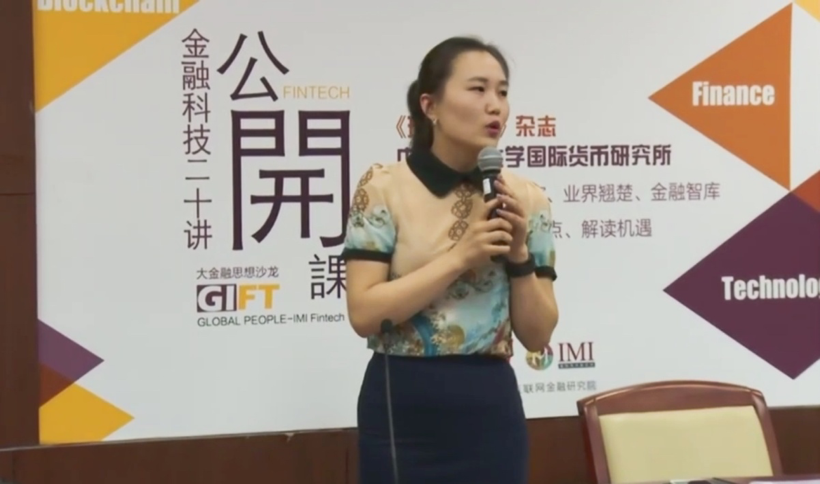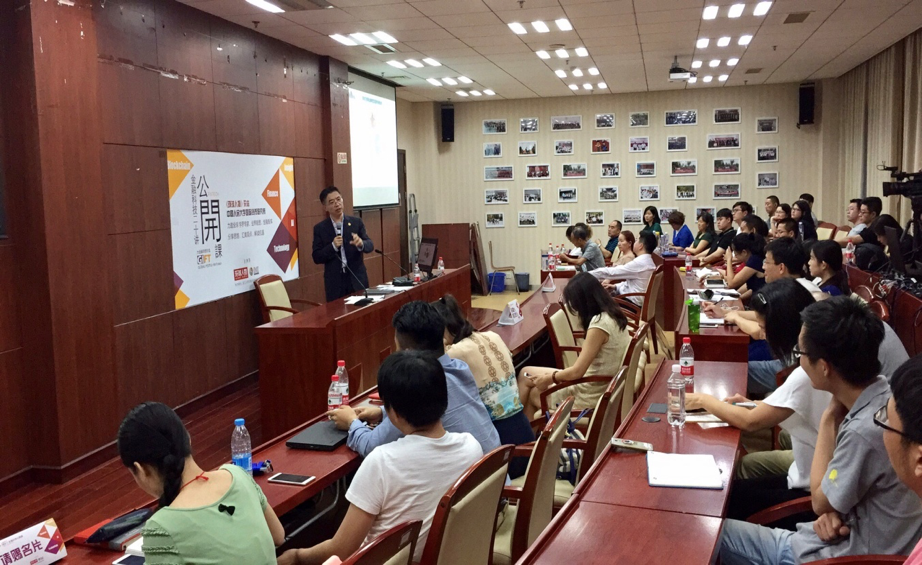Macro-Finance Salon (No. 69) and Fintech Open Classes (No. 9): New Situation and New Opportunity—The Transformation and Development of Internet Finance
2017-06-27 IMI From the perspective of the new situation facing financial security, Prof. Ben explained how to properly handle the relationship between the development of Internet finance and security, and distinguished the definition of Internet finance from that of Fintech. He reviewed the statement made by President Xi Jinping on financial security and the remarks made by Lu Shuchun, Secretary General of the National Internet Finance Association, at the forum on "Fintech Development and Security" in June. Prof. Ben confirmed the opinion on how to properly handle the development of Fintech and security, i.e. we should "focus on finance beyond superficial phenomenon; use Fintech to serve real economy and the public; guarantee security and control risks; concertedly promote development through virtuous competition; and integrate with the whole world and lead the future". He pointed out that the concept of Internet finance is related to that of Fintech to some extent, but not exactly the same. Internet finance refers to a new financial business model or format where institutions, including traditional financial institutions or IT and Internet companies, provide financing, payment, investment and information intermediary services on the Internet (including mobile Internet) platform. Fintech, on the other hand, refers to the financial innovation brought about by technology and the new business model, application, process or product that can be created, thus significantly influencing financial markets, financial institutions or the way that financial services are provided. Internationally, the concept and practice of Internet finance is a stage of Fintech development, and the core of the transformation from traditional finance to Internet finance must be the Internet.
From the perspective of the new situation facing financial security, Prof. Ben explained how to properly handle the relationship between the development of Internet finance and security, and distinguished the definition of Internet finance from that of Fintech. He reviewed the statement made by President Xi Jinping on financial security and the remarks made by Lu Shuchun, Secretary General of the National Internet Finance Association, at the forum on "Fintech Development and Security" in June. Prof. Ben confirmed the opinion on how to properly handle the development of Fintech and security, i.e. we should "focus on finance beyond superficial phenomenon; use Fintech to serve real economy and the public; guarantee security and control risks; concertedly promote development through virtuous competition; and integrate with the whole world and lead the future". He pointed out that the concept of Internet finance is related to that of Fintech to some extent, but not exactly the same. Internet finance refers to a new financial business model or format where institutions, including traditional financial institutions or IT and Internet companies, provide financing, payment, investment and information intermediary services on the Internet (including mobile Internet) platform. Fintech, on the other hand, refers to the financial innovation brought about by technology and the new business model, application, process or product that can be created, thus significantly influencing financial markets, financial institutions or the way that financial services are provided. Internationally, the concept and practice of Internet finance is a stage of Fintech development, and the core of the transformation from traditional finance to Internet finance must be the Internet.
 Next, Prof. Ben analyzed the development of several major sub-formats of Internet finance. He pointed out that the transaction volume and growth rate of third-party payment are rising, such as WeChat payment that can be applied to diversified scenarios, posing challenges to traditional institutions including the CUP. The scale of financial products is also growing rapidly. The return rate of Yu'e Bao, the world's largest money market fund, is more market-driven, if compared with the bank deposit rate, etc. Although we haven’t seen significant growth of Internet insurance which originated in China, it is going global and transforming the existing products and production. It is highly promising. The volume and platform of P2P lending in China are the world’s largest. Before 2011, it made its debut and started exploring; since 2012, it has exploded and even scored “wild growth”; in recent two years, it has genuinely started orderly development. Prof. Ben believed that the overall development of Internet finance is good but there still exist problems. In order to achieve sustainable and healthy development, Internet finance must be transformed.
Strategic positioning is of paramount importance to Internet finance transformation. On this point, he said that it is necessary to meet separate demands of small and micro clients and high net worth clients, make products of simple structure that can meet the needs of the public to control risks and can apply to all kinds of real life scenarios. The development of Internet finance needs to address issues of strategy orientation, survival, namely risk control, and development, namely how to handle complex relationships. In order to address the weak point on Institutional rules, it should handle five relationships. The first is the relationship between companies and the government regulation. Companies should embrace regulation. The second is the relationship between Internet finance and traditional finance. Traditional finance should embrace the Internet so as to make good use of existing monetary and financial resources and create new resources through Internet finance. The third is the relationship between regulation and development. It should embrace the future, regulation, and rules. Meanwhile, it must ensure institutional, procedural and efficient internal organization. The fourth is the relationship between market demands, technology, capability and rules and policies. Both the association of Internet finance and regulation system of the PBOC, CBRC, CIRC, CSRC require optimizing. Companies can also assist in supervising institutions. The fifth is the relationship between home and abroad. It is both an obligation and opportunity to export China’s successful experiences and models to other countries to win honor for China.
In the Q & A session, Prof. Ben answered questions from the audience, including how does Internet finance influence domestic investment banks; the future credit system in the Internet era; the development potential of third-party payment companies in the oligopoly competition; opportunities and risks of overseas payment; the core customized competencies of Internet finance companies; and how to regulate Internet finance.
Next, Prof. Ben analyzed the development of several major sub-formats of Internet finance. He pointed out that the transaction volume and growth rate of third-party payment are rising, such as WeChat payment that can be applied to diversified scenarios, posing challenges to traditional institutions including the CUP. The scale of financial products is also growing rapidly. The return rate of Yu'e Bao, the world's largest money market fund, is more market-driven, if compared with the bank deposit rate, etc. Although we haven’t seen significant growth of Internet insurance which originated in China, it is going global and transforming the existing products and production. It is highly promising. The volume and platform of P2P lending in China are the world’s largest. Before 2011, it made its debut and started exploring; since 2012, it has exploded and even scored “wild growth”; in recent two years, it has genuinely started orderly development. Prof. Ben believed that the overall development of Internet finance is good but there still exist problems. In order to achieve sustainable and healthy development, Internet finance must be transformed.
Strategic positioning is of paramount importance to Internet finance transformation. On this point, he said that it is necessary to meet separate demands of small and micro clients and high net worth clients, make products of simple structure that can meet the needs of the public to control risks and can apply to all kinds of real life scenarios. The development of Internet finance needs to address issues of strategy orientation, survival, namely risk control, and development, namely how to handle complex relationships. In order to address the weak point on Institutional rules, it should handle five relationships. The first is the relationship between companies and the government regulation. Companies should embrace regulation. The second is the relationship between Internet finance and traditional finance. Traditional finance should embrace the Internet so as to make good use of existing monetary and financial resources and create new resources through Internet finance. The third is the relationship between regulation and development. It should embrace the future, regulation, and rules. Meanwhile, it must ensure institutional, procedural and efficient internal organization. The fourth is the relationship between market demands, technology, capability and rules and policies. Both the association of Internet finance and regulation system of the PBOC, CBRC, CIRC, CSRC require optimizing. Companies can also assist in supervising institutions. The fifth is the relationship between home and abroad. It is both an obligation and opportunity to export China’s successful experiences and models to other countries to win honor for China.
In the Q & A session, Prof. Ben answered questions from the audience, including how does Internet finance influence domestic investment banks; the future credit system in the Internet era; the development potential of third-party payment companies in the oligopoly competition; opportunities and risks of overseas payment; the core customized competencies of Internet finance companies; and how to regulate Internet finance.

